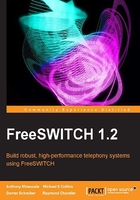
Setting up the FreeSWITCH environment
FreeSWITCH, like many other software applications, requires a suitable environment. Primarily that means choosing an appropriate operating system for your hardware and having the proper LAN/WAN connectivity and physical environment.
Operating system
The first question to consider here is: which operating system should be used? Generally speaking, it is good to use an operating system with which you are comfortable and familiar. One caveat to consider is 32-bit versus 64-bit. Some users have reported problems when running a 32-bit OS on a 64-bit hardware platform. We strongly recommend that you use a 64-bit OS if you have 64-bit hardware.
Those who prefer a Windows environment can use XP, Vista, Windows 7, Server 2003, Server 2008 R2, or Server 2012. Several users have reported good success with production systems running on modern hardware and using Windows Server 2008.
On the other hand, there is a wide variety of Unix-like operating systems available, many of which are freely downloadable. Most of us have an operating system (Linux, BSD, Solaris, and so on) and distribution (CentOS, Debian, Ubuntu, and so on) that we prefer to use. The FreeSWITCH developers do not advocate any particular operating system or distribution.
Some have asked which platform is the best for FreeSWITCH. There are many factors to consider when choosing a platform on which to run a telephony application. FreeSWITCH is cross-platform, and therefore, it compiles and runs on numerous systems. However, through hard-earned experience, we know which operating systems and distributions lend themselves to real-time telephony applications. The bottom line is that you want your system to be stable and reliable. The FreeSWITCH community has overwhelmingly endorsed CentOS 5 and Debian 6 as production-ready Linux distributions.
Note
As of the time of writing, there were concerns with the performance of FreeSWITCH under CentOS 6. Many members of the FreeSWITCH community report that these issues do not occur in CentOS 6.3. If you experience unusual symptoms in prior versions of CentOS Version 6 then try using CentOS 6.3.
Keep in mind that bleeding edge distributions generally are not appropriate for real-time telephony systems. Boring and predictable are preferable to latest and greatest.